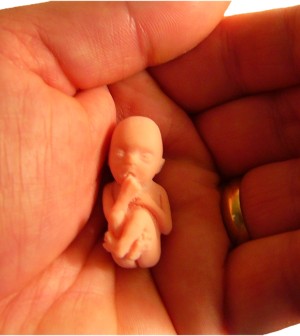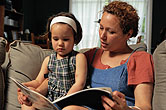- 10 Strategies to Overcome Insomnia
- Could Artificial Sweeteners Be Aging the Brain Faster?
- Techniques for Soothing Your Nervous System
- Does the Water in Your House Smell Funny? Here’s Why
- Can a Daily Dose of Apple Cider Vinegar Actually Aid Weight Loss?
- 6 Health Beverages That Can Actually Spike Your Blood Sugar
- Treatment Options for Social Anxiety Disorder
- Understanding the Connection Between Anxiety and Depression
- How Daily Prunes Can Influence Cholesterol and Inflammation
- When to Take B12 for Better Absorption and Energy
Vocabulary at 2 May Help Predict Kindergarten Success


Children with a larger speaking vocabulary at age 2 are better prepared for kindergarten, a new study shows.
And prior research has shown that kids who function better in kindergarten have greater social and educational opportunities as they grow up, according to background notes in the study.
The analysis of data from more than 8,600 children in the United States showed that 2-year-olds with larger speaking vocabularies did better academically and had fewer behavioral problems when they later entered kindergarten.
Children with larger vocabularies at age 2 tended to be from higher-income families, girls, and those who had higher-quality parenting, the study found. Children who had a very low birth weight or whose mothers had health problems had smaller speaking vocabularies.
The study was published Aug. 18 in the journal Child Development.
“Our findings provide compelling evidence for oral vocabulary’s theorized importance as a multifaceted contributor to children’s early development,” study leader Paul Morgan, an associate professor of education at Pennsylvania State University, said in a journal news release.
“Our findings are also consistent with prior work suggesting that parents who are stressed, overburdened, less engaged, and who experience less social support may talk, read, or otherwise interact with their children less frequently, resulting in their children acquiring smaller oral vocabularies,” he added.
These vocabulary gaps emerge as early as 2, the researchers say. But early efforts to increase vocabulary may help at-risk toddlers subsequently enter kindergarten better prepared academically and behaviorally, they point out.
“Interventions may need to be targeted to 2-year-olds being raised in disadvantaged home environments,” study co-author George Farkas, a professor of education at the University of California, Irvine, said in the news release.
One step might involve having nurses make regular visits to disadvantaged first-time mothers during and after their pregnancies to offer parenting help and connect them with social services and other support systems, the researchers said.
More information
The U.S. National Institute on Deafness and Other Communication Disorders has more about speech and language development.
Source: HealthDay
Copyright © 2026 HealthDay. All rights reserved.










